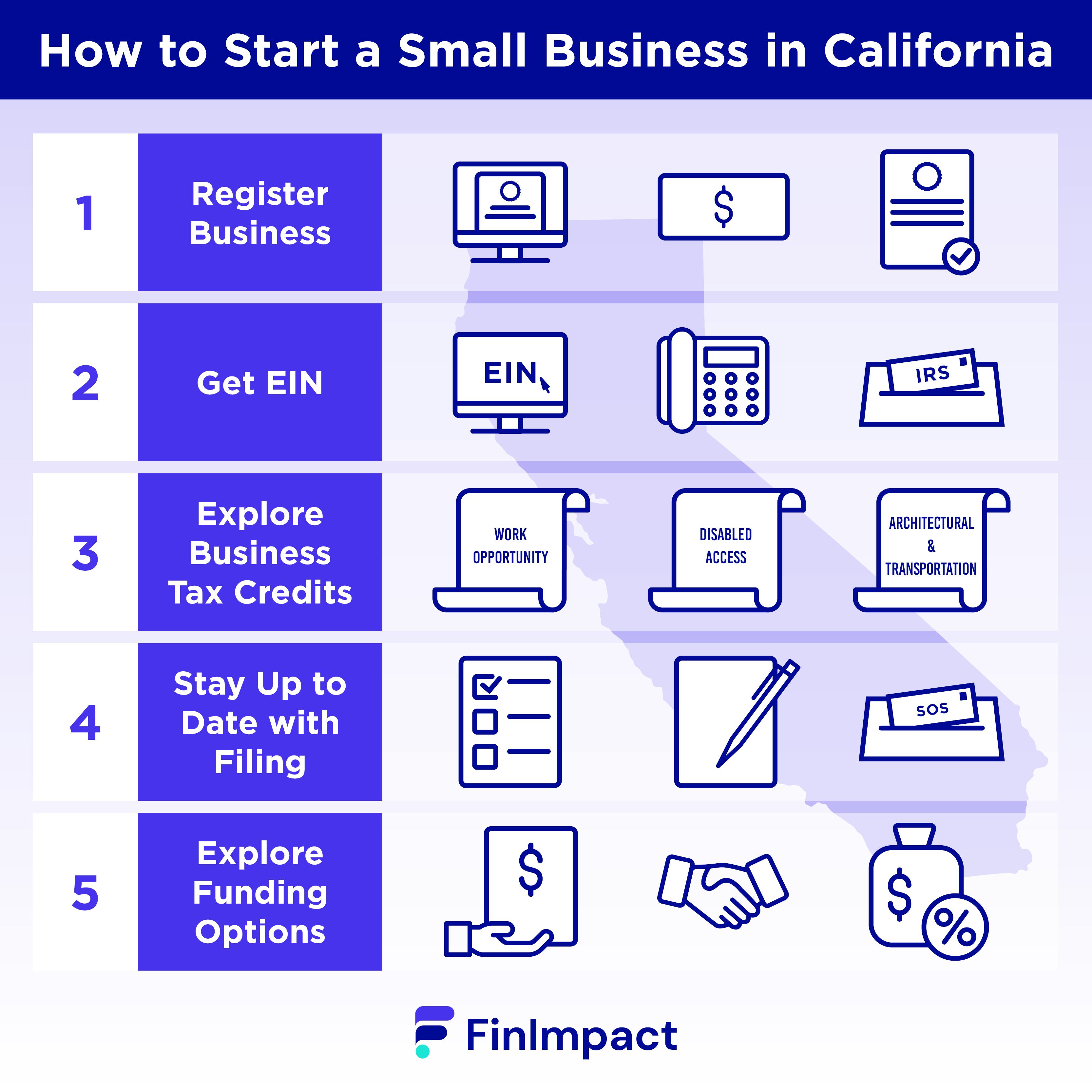| All content presented here and elsewhere is solely intended for informational purposes only. The reader is required to seek professional counsel before beginning any legal or financial endeavor. |

1. Register Your Business In California
Here are the registration requirements for different business structures in California:
- Sole proprietorship: you are not required to file any business documents. However, if you use a different name than your own, (eg John Jacob’s Pizza) the California Secretary of State does recommend that you file a Fictitious Business Name Statement in the county in which you operate your business.
- LLC or corporation: you will have to file the Articles of Organization or Articles of Incorporation with the state. You can file these documents through the California Secretary of State's website. You’ll have to pay a $70 fee to file your Articles of Organization for an LLC. But the fee will increase to $100 if you are filing Articles of Incorporation for a corporation. In both cases, you’ll have to appoint a registered agent with a California address.
As an LLC, you will have to file a Statement of Information within 90 days of incorporation. After that, LLCs and corporations will need to file Statements of Information every other year. The cost to file this paperwork is ‘$20, although there are heft late fees. Corporations need to file a Statement of Information within 90 days, and annually thereafter.
Some industries have additional licensing requirements. If you have questions about the registration process, see the California Small Business Development Center.
2. Get an Employer Identification Number
Before you start a business in California, or any state, you’ll need an Employer Identification Number (EIN).
Your EIN functions like a Social Security number for your business. It serves as a unique identifier for your company, and you’ll use it when you apply for bank accounts or loans or go to pay your taxes. You’ll also need an EIN to be able to pay your employees, if you have any.
You can get an EIN for free from the IRS website. All you need to do is submit a short online application.
Video: How To Start A Business In California:
3. Explore California Business Tax Credits
California has some of the highest taxes for individuals and businesses in the US. The state even taxes residents that work or own businesses in other states as well as the pass-through earnings from LLCs.
Given this high potential tax burden, you should do whatever you can to try to reduce your company’s tax burden.
Some popular tax credits that are available include:
- Work Opportunity Tax Credit: This federal credit can provide a tax credit of up to $9,600 to business owners who hire members of a target group, such as veterans, ex-felons, food stamp recipients, and other unprivileged groups.
- Disabled Access Credit: This federal credit helps reimburse companies for costs they pay to provide access to people with disabilities.
- Architectural and Transportation Tax Deduction: This offers a deduction up to $15,000 for making architectural or transportation changes to your business to make it more accessible for people with disabilities and the elderly.
4. Stay Up to Date with Ongoing Filing Requirements
Businesses in California must regularly file documents with the state government to remain up to date and in good standing with the state. The most important document is the Statement of Information which you must file each year or every other year depending on the way you’ve formed your company. For example, corporations file annually while LLCs file every other year.
The Statement of Information contains details such as:
- Your company’s registered agent
- Its principal officers and directors
- Where your business is located
- A statement of your company’s line of business
- Contact information for executives and managers

Filing this form is important. Failure to file can incur a penalty of up to $250.
5. Explore Your Funding Options
Small business owners often need an influx of capital to kickstart their idea. If you’ve crafted a realistic business plan, you likely have a good estimate of the amount of capital you’ll need.
Here are some ways to obtain funding for your business and address the issue of how to raise capital for a startup:
- Apply for any grants you may qualify for through the state.
- Seek out venture capital from investors: Although billions of dollars in venture capital are available in California, obtaining this type of funding is still challenging.
- Apply for a small business loan: With the right small business loan, you can access the funds you need for your business startup costs at competitive rates while maintaining control of your business.
Torro offers competitive small business loans with minimal hassle.

Final Word
If you decide to start a new business in California, the possibilities are limitless. The sheer volume of venture capital flowing through the state represents an exciting opportunity for entrepreneurs everywhere.
But the possibilities don’t end there! You can tap into good loans to start your business in the Golden State. Explore your small business startup loan options today.
